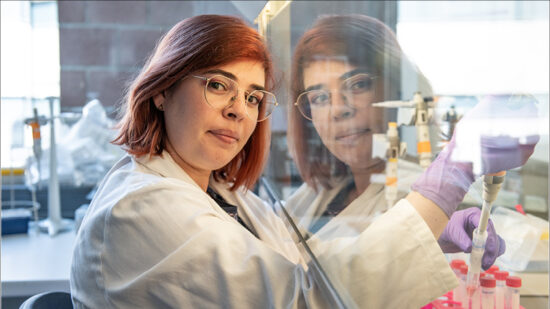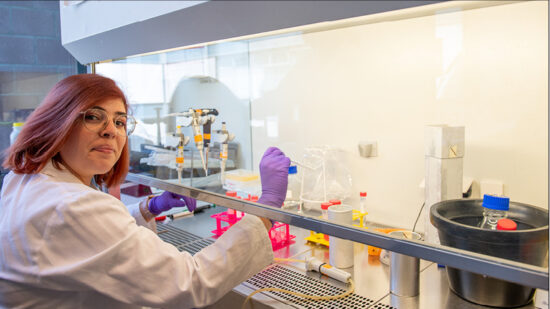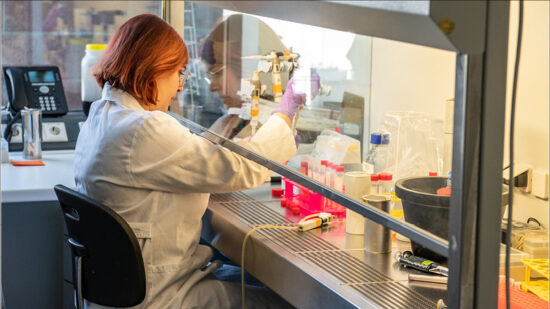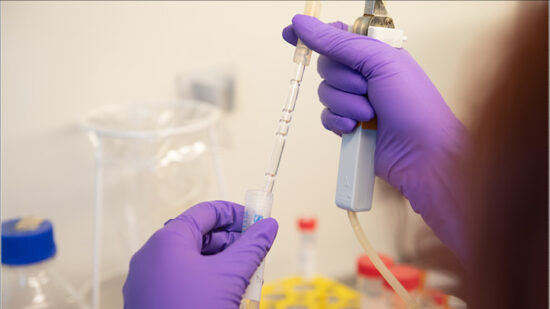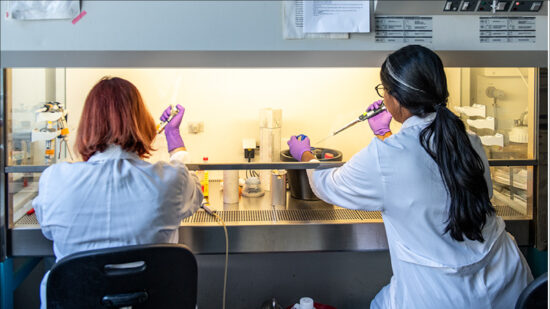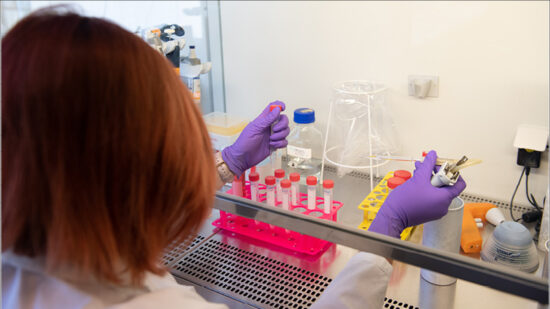Second DRFZ postdoc fellowship awarded
Interview with scholarship holder Marta Ferreira-Gomes
The DRFZ YOUNG TALENTS FELLOWSHIP has been awarded every two years since 2019 to particularly talented young scientists. The fellowship is tailored to postdocs already working at the DRFZ and includes full salary for two years.
The second DRFZ YOUNG TALENTS FELLOWSHIP scholarship holder is Marta Ferreira-Gomes from the Mashreghi research group. We asked her what she hopes to get out of the two-year scholarship. The interview was conducted in 2021.
Marta gained some experience of working with B cells during her doctoral thesis at the Friedrich Schiller University, Jena before moving to the DRFZ in 2019 to work on memory B lymphocytes in the groups of Andreas Radbruch and Mir-Farzin Mashreghi. In a surprising finding for many experts in the field, Marta and her colleagues at the DRFZ were able to show for the first time that most memory B lymphocytes, like memory plasma cells, are found in the bone marrow. These cells most likely also survive there in a similar way to plasma cells and are therefore also thought to be resistant to conventional therapies. Using single-cell transcriptome analysis, Marta was even able to identify different types of memory B lymphocytes in the bone marrow.
With the onset of the pandemic in 2020, Marta began to investigate the significance of B cells in severe cases of COVID-19. Together with colleagues from the DRFZ, she discovered that the antibodies produced by B cells in severely ill patients are no longer directed against the virus, but rather against the patient’s own body. In these cases, chronic inflammation develops, which is instructed by the cytokine TGF-β.
Marta Ferreira-Gomes is not only an enthusiastic researcher, but is also involved in the Leibniz PostDoc Network.
You have been a postdoctoral fellow at the DRFZ since 2019. How have you been financed so far? Can you describe your career point at the time of your application?
I asked Andreas Radbruch for an opportunity to work in his group during a B cell conference in 2018. Resulting from that encounter I was able to join his group in the beginning of 2019, being financed until June 2021 partially by the Transregional Collaborative Research Center “B cells: Immunity and Autoimmunity” (TRR130) and partially by the Horizon 2020 action Rheuma Tolerance for Cure (RTCure). In the framework of these projects, the main goal of my research is to better understand the organization and heterogeneity of memory B cells, which are crucial for protection but are also involved in numerous disease pathogenesis. The present COVID-19 pandemic has partially redirected my efforts. I was involved in a DRFZ – Charité collaborative project analysing B cell responses of severe COVID-19 patients and I am currently working on a project that aims to analyze B and T cell responses resulting from COVID-19 vaccination. All this work was developed in close collaboration with the group of Mir-Farzin Mashreghi, who is now, and until the end of the year, directly funding my position. Working in all these different projects made me learn a lot, and because of that I can say that I am at a point of my career where I am ready to take on more responsibility and start my very own project.
What is the goal of your research project?
In summary, the goal of my research project is to obtain a clearer picture of human switched memory B cell heterogeneity and re-activation mechanisms to try to identify markers for targeting memory B cells driving chronic inflammation. To do so, I will analyze memory B cells from both healthy individuals and rheumatoid arthritis patients to hopefully pinpoint subpopulations which might be enriched in “pathogenic B cells” and therefore a target to achieve disease amelioration.
What opportunities does the Young Talents Fellowship offer you and what do you expect from these two years?
The greatest opportunity of having been awarded this fellowship is the possibility to conduct my own project, and especially here at the DRFZ, where the close collaboration between research groups and with the Charité allows me to have access to materials, techniques and scientific expertise that would not be so easily available elsewhere. I hope that in these two years I succeed in completing all the project milestones I proposed, publish my results and build a structure that leads me in the direction of forming my own research group. And because science is not only made of laboratory work, I will also use this opportunity to keep investing in my education and networking possibilities.
What are your medium-term career goals, where are you heading?
My career goal is to have my own research group, and to establish it in a collaboration-rich environment. To that end I am trying not only to keep up with state-of-the art literature and methodologies related to my research projects, but also to learn as much as I can in the direction of laboratory management, leadership and teaching, so I can offer the best possible support to young scientists working with me. I am also happy to keep being involved with the Leibniz Postdoc Network, as it is a way of getting in touch with other fields of research, science policies and projects to promote better conditions for scientists.
You are also active in the DRZF Postdoc College. Many postdocs look to their future in research with uncertainty, especially due to the often limited funding. What is your view on the situation for postdocs in Germany?
I do believe that most postdocs follow this career path out of their passion for science. But that does not mean we don’t have private life goals and bills to pay. Achieving a good life-work balance is already hard due to the working hours that lab experiments demand, and adding the uncertainty of short-term contracts results in the loss of many excellent scientists to outside-of-academia jobs. In my opinion, there should be not only more investment to keep good scientists in research institutes, but also more support structures so that researchers can find that life-work balance and be able to better focus on their research.

 Deutsch
Deutsch